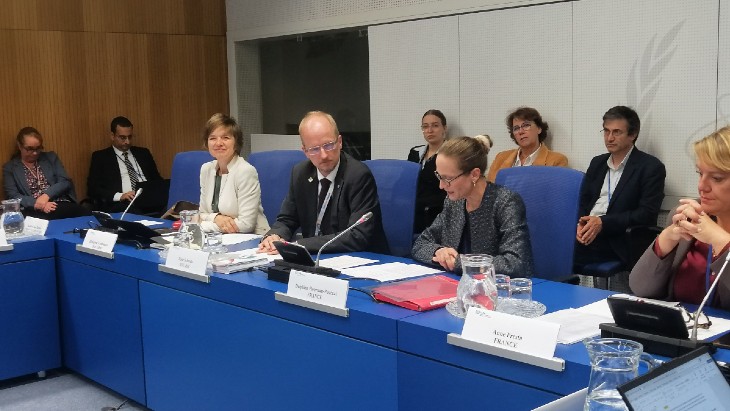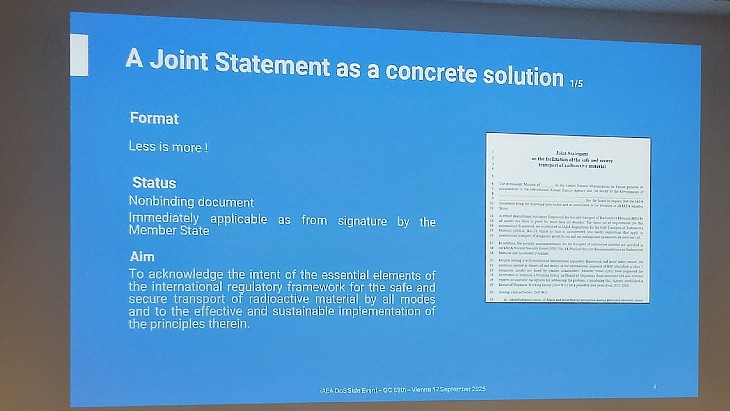A side event at the International Atomic Energy Agency (IAEA’s) 69th General Conference in Vienna, was entitled Facilitation of the Safe and Secure Transport of Radioactive Material: a Joint Statement as a Concrete Solution.
The event was co-organised by France, Canada, Italy and World Nuclear Association and supported by IAEA. Its purpose was to engage Member States on the importance of and efforts taken to address delays and denial of shipment during the transport of radioactive material. A denial of shipment is the refusal of a port, an airport, or a carrier to accept a shipment, even if it is fully compliant with all regulations, and is an everyday occurrence all over the world. It has been a focal point for more than two decades.
The event also provided an update on the progress of the work of the IAEA’s Denial of Shipment Working Group, which was established in 2023, and outlined work towards issuing a Joint Statement on the issue.
Attendees were told that a planned Code of Conduct had not been agreed by member states last year and instead there would be a non-legally-binding Joint Statement, which countries can sign up to, to facilitate the transport of Class 7 material across the world. (Radioactive materials are Class 7 materials under UN regulations on the transport of dangerous goods).
The French ambassador to the International Organisations in Vienna, Delphine Hournau-Pouëzat, said: "We all know that the safe and secure transport of radioactive materials is governed by a well-established and robust international regulatory framework. Despite this, the industry has been confronted for many years with some denials of, or delays in, shipments. These difficulties have different causes, as we all know. They may relate to perceptions of the risk, to complexities in national and local policies, just to name a few. For that, we have been working collectively for many years now to find practical solutions to overcome the problem."

The French ambassador opened the session (Image: World Nuclear News)
Hildegarde Vandenhove, director of the IAEA's division of radiation transport and waste safety, said that for more than six decades member states had "upheld one of the most robust and successful regulatory frameworks in existence, a framework that ensures radioactive material can be transported safely and securely across all modes of transport anywhere in the world".
She stressed that this involved not only member states but also others, such as the International Maritime Organization and the International Civil Aviation Organization: "The safe and secure transport of radioactive material is not merely a technical necessity, it's a cornerstone of global health, energy and innovation. From powering hospitals with life-saving legal pharmaceuticals, to supporting clean energy production, these materials must reach their destination reliably and without incident and without any delay."
Diana Paez, head of the IAEA's Nuclear Medicine and Diagnostic Imaging Section, listed IAEA initiatives on cancer and healthcare, wildlife, agriculture/food and cutting plastic waste, which all rely on radioactive materials and their transport.
Ana Rita Lopes Ramos, head of the radiation protection and nuclear safety unit at the European Commission, stressed the importance of medical isotopes, saying "the supply chain of radioisotopes is something fragile, which we in Europe have observed" and the commission had heard early on about the transport issues as it sought to improve the security of supply of radioisotopes.
She noted that the international framework was not harmonised, even within the European Union, giving the example of carriers needing to be licensed to carry such material in each country, or of containers needing to be certified in each country's jurisdiction.
And, she said, there was an issue of awareness and understanding, with examples including "medical radioisotopes, something that has a very short half-life, getting bumped from the flight where it's supposed to go … maybe because the container with the medical radioisotopes is not marked as perishable".
Michael Meier, from Orano Nuclear Packages and Services, set out some of the difficulties encountered when transporting Class 7 material by sea, saying there are international regulations, which are supplemented by national law and local decrees and it is not as simple as saying a port will accept Class 7 material as it may depend on the specific commodity, and within the port some terminals might accept them, while others do not. It can take anything from 2 to 20 days to obtain necessary permits.
He added: "For Class 7, most ports don't accept storage. The containers must be transferred directly from the vessel to rail or truck. Any bottlenecks in this step … can cause major delays for the terminal and for the sea transport." He also said that for every stop on a journey, even if just in transit, a full series of permissions and approvals was required - and some of the world's largest ports refuse to accept transit shipments, while others mandate the presence of firefighters.
"The denial or delay is not the result of a simple cause, but a combination of regulatory complexity, a lack of training, and an inconsistent terminal policy. These obstacles create significant delay and can even hinder access to essential products like medical isotopes," said Meier - with some international shipping companies considering the burden of Class 7 as too high, while "worse still, it someomes encourages some shippers to not properly declare the goods, creating additional safety risks".
Sama Bilbao y León, Director General of World Nuclear Association, said: "I think that bringing together governments, regulators and industry truly allows us to focus on an issue that is really central to what we do in nuclear energy and nuclear science and technology and our contribution to society. Each year, around 20 million packages of radioactive material are shipped safely all over the world - which is really an extraordinary achievement that probably very few people know."
Without transport "reactors cannot operate, hospitals cannot access life-saving isotopes" and food security and environmental protection will be harmed. The two foundations of the transport system was a "robust regulatory framework, but also a mature and very experienced industry that applies these safety regulations, these transport regulations, with competence".
She said the industry and the association were investing in training, compliance and working with other organisations such as the World Nuclear Transport Institute and seeking "to raise awareness and spread the word about some of the solutions".
"Every denial or delay carries actual consequences. And in some instances, it's actually not very difficult to resolve these problems through dialogue. In all cases, however, international support is absolutely essential … also because the industry alone cannot overcome every challenge, I think it is essential that industry, together with governments, together with international organisations, play this vital role that we all have. So this is why we very warmly welcome the leadership of several member states in proposing this Joint Statement because we believe it's a concrete step that is going to hopefully help move the world forward."
Shazia Fayyaz, Head of the IAEA's Transport Safety Unit, outlined the system of national focal points - people who can be contacted when there are issues with such shipments. There are currently 72 countries with focal points who can help to facilitate shipments. She said current initiatives included trying to increase awareness and knowledge among customs organisations and said there was a plan to hold an international conference in March 2026 on safe and secure transport.
Paolo Alvano, from Italy's National Regulatory Authority and chairman of the IAEA's Denial of Shipment Working Group, said the group recognised there was an "international framework which is strongly complex and provides a strong basis from the regulatory point of view" but in its work it identified causes of transport issues including "regulatory variation between member states, perception among involved parties, different stakeholders, complexity in national and local policies, cost of compliance related to the profitability of transporting Class 7".
He said that a draft Joint Statement had been discussed at the last working group meeting: "the draft was considered, reviewed, commented and then sent back to the Member States" who "did a lot of rephrasing and so on, and then we have then developed a final draft version".
Anne Presta, from Orano, and the IAEA working group, said the issue was that despite a "robust regulatory framework" the industry - shippers, consigners, consignees, freight forwarders, carriers - "do struggle every day in implementing transport" for reasons including a lack of harmonisation of regulation and the risk perception related to the radioactive or nuclear material.

(Image: World Nuclear News)
She said that the work to find a "concrete solution" had led to the plan to produce "an IAEA document, as a Joint Statement of member states. A few words. Less is more". She added: "We don't want to add another constraint in terms of paperwork, or too many commitments for member states."
She said that although the statement would not be legally binding, once signed by the Member State "it's a way for them to launch a positive, strong message to all stakeholders involved in transportation - to say please facilitate transport of radioactive material, radioactive and nuclear material". It would also include a "commitment to promote public awareness and education on the risk associated with transport of radioactive material because one of the main causes of denial or delay of shipment, is a lack of education and lack of awareness".
The joint statement is, she said, "a start, the triggering of a new era for trying to tackle this denial of shipment. And we want to create this dialogue between member states, carriers, authorities, a dialogue to share the views, the issues, and solutions".

_75856.jpg)





_55401.png)
_23009.jpg)






